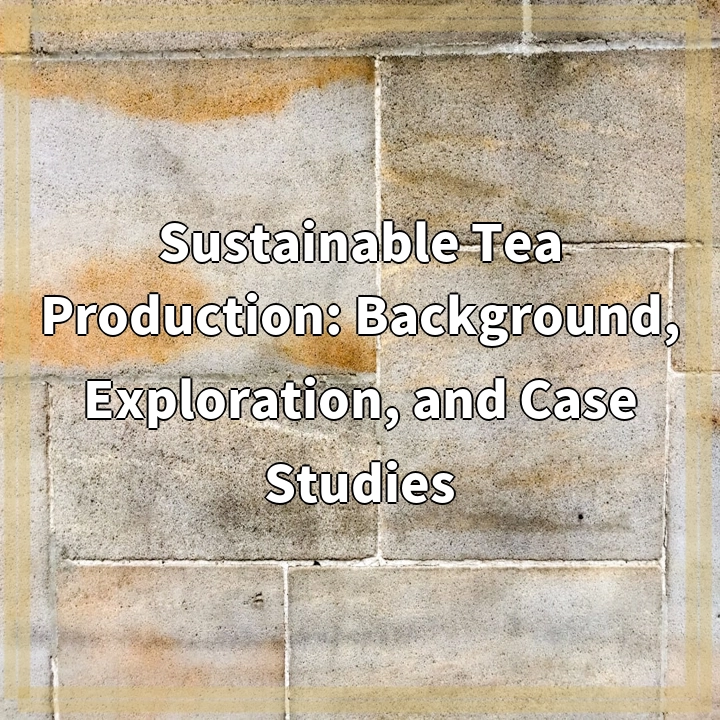
What is Sustainable Tea Production?
Sustainable tea production refers to the cultivation and processing of tea leaves in a manner that minimizes environmental impact, promotes social responsibility, and ensures the long-term viability of tea plantations. It involves adopting practices that conserve natural resources, protect biodiversity, provide fair working conditions, and support the well-being of local communities.
Real-World Problems Associated with Sustainable Tea Production
1. Deforestation and Habitat Loss
The expansion of tea plantations often leads to deforestation, which results in the destruction of valuable forest ecosystems and habitats. This loss of habitat threatens biodiversity, including the loss of native plant and animal species that rely on these forests for survival.
2. Agrochemical Use and Water Pollution
Intensive tea cultivation often involves the excessive use of agrochemicals such as pesticides and fertilizers. Improper application and handling of these chemicals can contribute to water pollution, including the contamination of nearby rivers and streams. This pollution can harm aquatic ecosystems, impact water quality, and pose risks to human health in surrounding communities.
3. Unfair Labor Practices
The tea industry has been criticized for unfair labor practices, including low wages, long working hours, and poor working conditions. Workers on tea plantations may face exploitation, limited access to education and healthcare, and lack of social and economic opportunities.
4. Soil Erosion and Degradation
Conventional tea production practices often involve the use of heavy machinery, monoculture farming, and improper land management techniques. These practices can lead to soil erosion, loss of topsoil, and soil degradation. As a result, the long-term fertility and productivity of tea plantations may be compromised.
5. Climate Change Impacts
Climate change poses significant challenges to tea production. Rising temperatures, irregular rainfall patterns, and the increased incidence of pests and diseases threaten the viability of tea plantations. Additionally, extreme weather events such as droughts and floods can cause damage to tea crops and impact overall productivity.

Promoting Solutions for Sustainable Tea Production
1. Adopting Agroecological Practices
By implementing agroecological practices, such as organic farming and integrated pest management, tea producers can reduce reliance on agrochemicals and protect the environment. These practices focus on enhancing soil health, preserving biodiversity, and promoting natural pest control methods.
2. Implementing Forest Conservation Measures
To address deforestation and habitat loss, tea producers can establish and protect forested areas within or adjacent to plantations. This helps maintain biodiversity, provides habitat for wildlife, and supports important ecosystem services. Additionally, reforestation initiatives can help to restore and connect fragmented forest landscapes.
3. Promoting Fair Trade and Social Responsibility
Tea companies and certifications can take steps to ensure fair wages, decent working conditions, and improved social welfare for tea plantation workers. Supporting fair trade practices empowers farmers and workers, promotes community development, and facilitates access to education and healthcare.
4. Encouraging Sustainable Water Management
To address water pollution, tea producers should implement proper water management practices. This includes reducing chemical use, adopting efficient irrigation systems, and implementing measures to prevent runoff and reduce soil erosion. Proper wastewater treatment facilities can also be installed to minimize water pollution from processing activities.
5. Building Climate Resilience
Building climate resilience in tea production involves adopting climate-smart agriculture techniques, such as planting shade trees, implementing water conservation measures, and diversifying crops. Research and development focusing on heat-tolerant tea varieties and pest and disease management strategies can also help protect tea plantations from the impacts of climate change.
6. Engaging Stakeholders and Consumers
Achieving sustainability in tea production requires the collective effort of various stakeholders, including tea producers, governments, NGOs, and consumers. Engaging in dialogue, raising awareness, and supporting sustainable tea initiatives through purchasing decisions can drive positive change in the industry and encourage wider adoption of sustainable practices.















